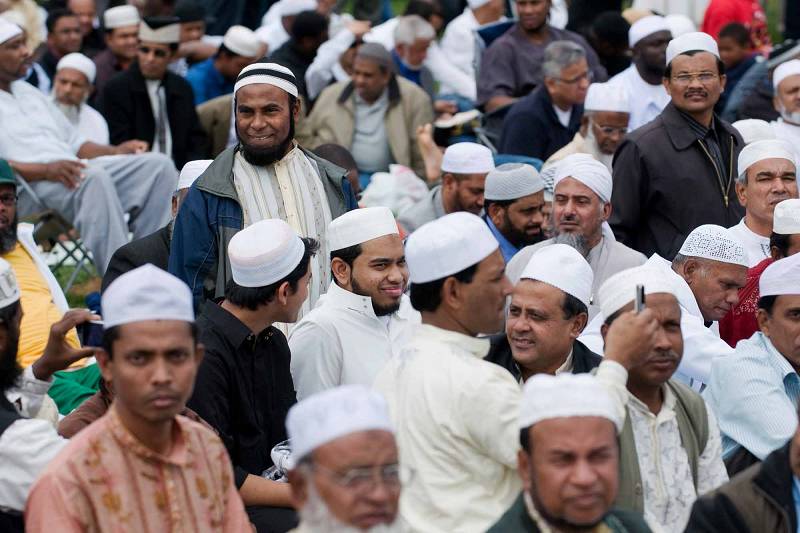
WASHINGTON (BP) — While most Muslims worldwide reject suicide bombings and other violence in the name of Islam, a significant minority of Muslims in Palestinian territories and Afghanistan favor such acts, according to new Pew Research Center findings.
“Muslims in some countries surveyed in South Asia and the Middle East-North Africa region are more likely than Muslims elsewhere to consider suicide bombing justified,” according to the Pew Research Center’s Forum on Religion & Public Life, a survey of 38,000 Muslims in 39 countries across Europe, Asia, the Middle East and Africa.
In Palestinian territories, 40 percent of Muslims favor violence in the name of Islam while 49 percent take the opposite view. In Afghanistan, 39 percent favor such violence. In Egypt, about 29 percent consider suicide bombing justified at least sometimes, Pew reported, compared to only 15 percent in Jordan, 12 percent in Tunisia and 7 percent in Iraq.
Still, concepts and acceptance of sharia law and religious freedom vary widely among the world’s Muslims, seemingly dichotomously, with many Muslims saying they favor Islamic law and religious freedom simultaneously because there’s no global definition of sharia law or religious freedom that Muslims embrace.
James Bell, primary researcher for the Pew study, said one of its key aims was to learn what average Muslims mean by sharia law and what role they want it to play in their lives and in their society.
“One of the things the survey finds is that most adherents of the world’s second-largest faith want sharia to be the official law of the land in their country,” Bell said. “But I would note that support for making sharia law does vary, and that at a regional level, we see much lower support for making Islamic law the law of the land in southern and Eastern Europe and Central Asia where medians of 20 percent or fewer hold his view.”
One of the key contributions of the study, Bell said, “is to demonstrate empirically that if we did stop there, we would have an incomplete picture of how Muslims around the world view Islamic law … because we find that even in many countries, where there’s strong support for enshrining Islamic law as official law, there’s also overwhelming support for religious freedom for non-Muslims.”
Amaney Jamal, an associate professor of politics at Princeton University and special adviser to the study, explained the seemingly conflicting findings.
“The one thing that stands out is that this idea, this construct that sharia law is this unified, holistic system of Islamic governance is perhaps false. The idea here is that there really isn’t a monolithic code of sharia laws or a monolithic code of what constitutes Islamic law,” Jamal said. “Across every country, across every society, what encapsulates this notion of sharia, what encapsulates this notion of Islamic law, varies.”
Muslims tend to be most comfortable using sharia in domestic matters such as settling family or property disputes, but less in matters involving severe punishment such as cutting off hands of thieves or executing people who convert from Islam to other faiths, according to the study’s executive summary.
In countries where Muslims favor making sharia the law of the land, those who approve of severe punishment include 76 percent of Muslims in Palestinian territories, 70 percent of those in Egypt, 57 percent in Jordan, 56 percent in Iraq, 50 percent in Lebanon and 44 percent in Tunisia, the study found.
Jamal, who participated in a media conference call April 30 regarding the Pew study, said concepts of sharia vary depending on a country’s history.
“So in countries that have had a repressive history, countries that have witnessed little religious conflict … citizens tend to feel that applying some code of law that represents or is informed by Islamic ideals … about social justice, equality, redistribution, rather than rigid applications of things that are permissible or not permissible … there tends to be a tendency to [put faith in] what Islam can do for societies,” Jamal said.
Farid Senzai, director of research at the Institute for Social Policy and Understanding and also a conference call participant, said the study’s results show Muslims overwhelmingly view democracy and sharia law as somewhat compatible.
“You can have a democracy but yet also have strong support for Islam to play a role in politics,” Senzai said. “The evidence suggests that Muslims overwhelmingly support democracy and the majority also want sharia to play a role in politics.”
But the extent to which democracy and sharia can co-exist is not consistent across all countries, Senzai said.
“The Arab Spring that we witnessed in the last couple of years and the transitions taking place is very much looking at this question. … Clearly Muslims have supported democracy and the overwhelming majority have wanted to participate in democracy as we’ve seen in the Arab Spring,” Senzai said. “Yet, as we’ve also seen, Islamist groups and groups that are religiously oriented also are playing an active role and have been winning in many of those elections. Egypt is the case in point.”
The report incorporates findings from a survey conducted in two waves. The survey began in 2008 when 15 sub-Saharan African countries with substantial Muslim populations were surveyed. Pew’s 2010 report “Tolerance and Tension: Islam and Christianity in Sub-Saharan Africa,” included some of those results. The survey continued in 2011, when an additional 24 countries in Europe, Asia, the Middle East and Africa were surveyed. Pew published results regarding religious beliefs and practices in its 2012 report “The World’s Muslims: Unity and Diversity.” Some survey questions were not asked in countries where such an inquiry would have caused too much controversy, Pew reported.
–30–
Diana Chandler is Baptist Press’ staff writer. Get Baptist Press headlines and breaking news on Twitter (@BaptistPress), Facebook (Facebook.com/BaptistPress) and in your email (baptistpress.com/SubscribeBP.asp).

















